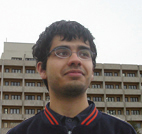Seventy-Eight Cards and Eighty-Seven Years
Last Friday, I took on our school's entire Department of Philosophy in a complex card game, despite the fact that I was playing it for the first time and could barely comprehend the rules -- and I lost. Miserably. My smug satisfaction at having gotten what I believed to be a good hand quickly turned into desperation, and the whole tragedy (it was a tragedy from my point of view, at least) ended with a shrill scream of "Who devised the rules of this thing, Mephistopheles?" from a thoroughly humiliated graduate student. Though it was through no flight of fancy that I indulged in a mysterious card game (and probably lost my soul, since bets in this game are apparently called "contracts," and I lost 248 of something in a contract of mine -- I'm not sure what, but I've been feeling quite empty for the past few days): I was attending the recent Department of Philosophy workshop on Sir Michael Dummett, and the card game in question -- tarot -- happens to have been his infamous hobby (though it appears to have been not so much as a pastime as another front of research, for Sir Michael wrote more on this hobby than I probably ever will on biology). It therefore is only proper that I devote this week's column to his philosophy, and while it is beyond my meager ability to summarize the myriad issues analyzed by this exalted philosopher and the equally numerous questions left in his wake, I shall try to detail what little I could grasp of his life and works.
Despite my lack of direct knowledge regarding his personality, I found one aspect of Sir Michael's character immediately and particularly striking: he was very much a hands-on philosopher. Philosophy appears to us (by which I mean non-philosophers) as a detached activity -- the quintessential image of a philosopher is a wise old man resting in his cozy armchair and pondering the underlying causes behind events instead of actively participating in them. Just as one doesn't expect a medical researcher to go around and personally distribute the cure he devised, it is not usual for a philosopher to take part in the implementation of his ideas -- he can show us the door, but it is up to others to enter, for his business deals in the theoretical. Not so much so for Sir Michael: while he did much pondering on the many topics he analyzed over the years (including mathematics, logic, language, politics, religion, human rights and tarot history), he also personally assisted refugees denied entry -- if by some breach of protocol or international mishap Britain denied you refuge, Sir Michael arrived at the scene and argued you in. He and his wife Ann were also influential in combating racism in Britain, especially with regard to immigrants -- not the least of their contributions was making it clear that Britain's immigration policy had discriminatory undertones and campaigning for measures to rectify this issue.
His intellectual contributions are no less impressive, and I find it especially notable that Dummett started his education in history -- it appears that his interest in philosophy only began later on, but that interest was so keen it dominated the rest of his life. Likewise, despite his status as an influential philosopher of mathematics, he had little formal education in the field (despite his best efforts -- he had intended to take a course in mathematics, but was disallowed from doing so), and his knowledge was derived through personal effort. His interest in political philosophy and especially voting systems is another example of an area in which he gained proficiency after becoming intrigued by it -- Reginald Farquharson drew his attention to the subject, and Dummett responded by first publishing an article with him and then writing a couple of books on the topic (the intention behind those books -- making the theory behind voting systems readily available to those who devise and implement voting systems -- further demonstrates the importance Dummett gave to the practical aspects of philosophy). And of course, philosophy students will want to note that while the entire realism/antirealism debate has been raging in every conceivable form since the beginning of time, Dummett played a vital role in distilling the core of the issue.
…And despite having barely scratched the surface, this column should end here, lest I earn the ire of the Powers That Be (or rather, the Powers That Edit and Publish Columns) -- though I should also note to those who wonder about the title that a tarot deck usually has 78 cards, and it has been a bit over 87 years since Sir Michael's birth. I again wish to thank the Department of Philosophy for introducing me to the world of this great man (though I am still a bit embarrassed about the tarot demonstration session), and, since the world lost Sir Michael in 2011 and his wife, Ann Dummett, just less than a year ago, there is only one proper way to end this column: Requiescat in pace.
